I was born in Dallas during the years of the Korean War. I have not been to Love Field in years. There were many times that I flew in and out of it, before it was expanded, while it was under renovation, and even after they opened DFW, but what I remember most about Love Field is those metal boxes.
When we were kids in Dallas, high school in the late 60’s was a continuous party. My particular group from Lake Highlands did not have drugs as a centerpiece. We were into horses, horse shows, football games, and getting out of school a half day to go to work to pay for those toys and hobbies. We were into big hair, short skirts, high heels, fast cars and graduating as soon as possible. Looking at a high school class graduation picture of the Class of ’69, I have to admit, we were a handsome group.
But, there are bad memories of that time. Painful scars that will never go away, and every time someone says ‘war’, I think of Vietnam…and Love Field.
As I recall, there were many sad moments on television. Soldiers coming home. Coming home to final rest. Ceremony, honor guard, and grieving families filled the screens and pages of local news coverage. It seemed like every time you turned on the TV, someone else was coming home.
I don’t remember how many times I went to Love Field with someone who was receiving a metal box. Too many, I know that. But, I do remember that it got to be such a habit, going to Love Field, that we used to go there on Friday and Saturday night with our ‘steadies’ and watch the planes land and take off. I don’t know what it was. It was like we were drawn there for some reason. Together, we would sit together and laugh at memories of lives, and cry over the reality of the loses. We were too young, yet, to go to war. Too young to do anything about it. We were caught in the middle. The children of a time that was burying their dead – lost somewhere between family and forgotten. We were the children of Dallas - of the Kennedy Assassination – of Love Field.
We felt helpless. Hurt. Angry and weak. We couldn’t stop it. All we could do was be there. Be there just incase one of them was coming home. I suppose we felt like we were being loyal to them by being there. We didn’t really think that being there would stop it all. We mostly accepted – and came to expect – that there would be another plane. Another plane. With another metal box. But, I do not ever recall seeing one come in, flag draped. They were just cold, scuffed up, aluminum boxes.
The Nation mourned them together, mostly. Then, the poison atmosphere of protest began. Those pictures were vicious, and loud. The people seemed radical and almost insane. It was a frightening time of upheaval and change. We were young, impressionable kids who were losing brothers and friends in a war that we didn’t understand. Vietnam left us – and this Nation – emotionally wounded and empty.
Enter 2003.
"There will be no arrival ceremonies for, or media coverage of, deceased military personnel returning to or departing from Ramstein [Germany] airbase or Dover [Del.] base, to include interim stops." - Pentagon Directive (Credit: USAF, Dover Air Force Base Mortuary Procedures Manual)
Enter 2004.
Someone got photos released to them from the military through an information release. America saw, for the first time, in a long time. Though we lost 148 in Desert Storm, it was a quick effort of support of a UN Resolution. It only lasted a few weeks and it was gone. Vietnam lingers. Vietnam spanned generations, and six presidencies, from Truman to Ford. By the time Kennedy was killed, over 16,000 troops were there, and 100 had already come home – in a metal box. All of the memories of a bad war came flooding back.
Like so many others, I saw the photos of our Iraq and Afghan brave coming home. I am older now. I didn’t think it would move me like it did. It shook me to my very soul.
When I saw the first shot come up on the screen, I drew in a deep breath and whispered, “Oh my God.”
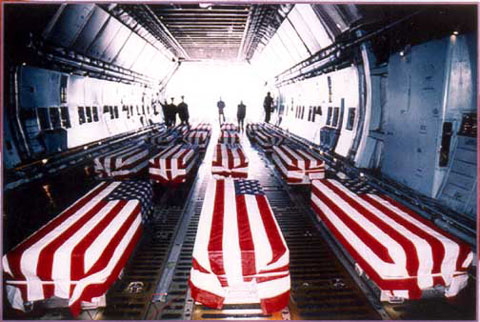
Deeply shocked by the long head-to-foot lines that stretched into the distance, the one striking thing that shocked me into a rush of deep emotion was the flags. Rows and rows of flags. I felt deeply humbled, overwhelming pride, and tremendous appreciation all at the same time.
But, I felt a little ashamed, too. Like I did in 1968 and 69. Ashamed that there was so much controversy, and ashamed that the Vietnam vets had come home without the honor and respect that they deserved, which immediately swelled into a rush of fear for those fighting this time.
I clicked on the next image. As it began to come up, I split the screen and began to try to put into words what I was feeling. It ended in a single paragraph.
We grieve in this time of our nation's losses - remembering the bravery, honor, and the ultimate sacrifice for freedom of our fallen. In a century of memories, we as a Nation have been allowed to grieve, to honor the fallen, to ceremoniously welcome them home in expression of our united compassion and humble thanks for their service. We salute and honor all the brave men and women of the United States Armed Forces, give thanks for their contribution to our freedom and liberty, and ask God to protect each and every one.
I find it ever so strange that the place I associate with those memories is called ‘love field’. With that, I leave you with the echoes of a century of the memories of war.
World War I -
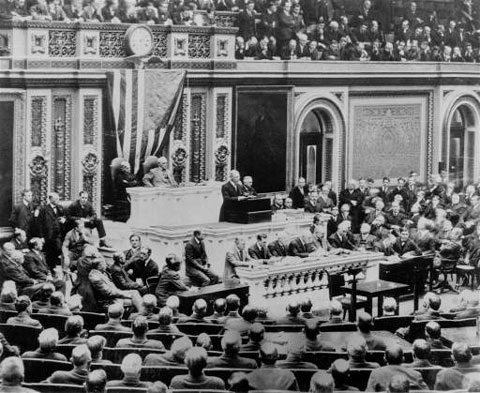
- President Woodrow Wilson, War Messages, 65th Cong., 1st Sess. Senate Doc. No. 5, Serial No. 7264, Washington, D.C., April 2, 1917; pp. 3-8, passim
World War II -
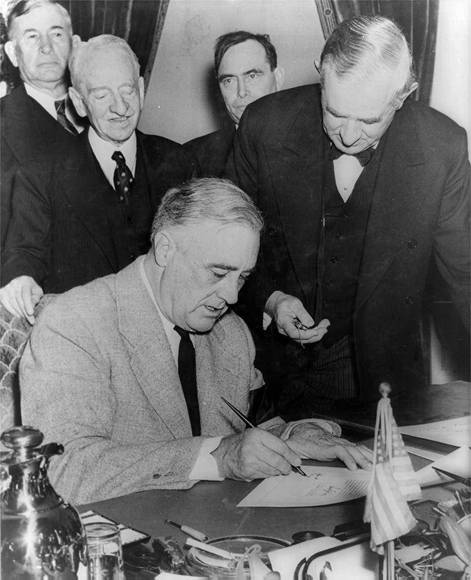
“…As Commander in Chief of the Army and Navy I have directed that all measures be taken for our defense.
“Always will we remember the character of the onslaught against us.
“No matter how long it may take us to overcome this premeditated invasion, the American people in their righteous might will win through to absolute victory.
“…Hostilities exist. There is no blinking at the fact that our people, our territory, and our interests are in grave danger.
“With confidence in our armed forces—with the unbounded determination of our people—we will gain the inevitable triumph—so help us God.” - Department of State Bulletin, vol. V, p. 474, Address Delivered by President Roosevelt to the Congress, December 8, 1941, from Peace and War - US Foreign Policy 1931-1941, US Dept. of State Publication No. 1983
Korea -

"We follow the course we have chosen with courage and with faith, because we carry in our hearts the flame of freedom. We are fighting for liberty and for peace - and with God's blessing, we shall succeed." - President Harry S. Truman, Address to Congress, July 19, 1950
Vietnam/Laos/Cambodia -
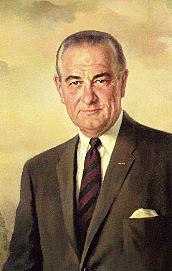
Note: The Vietnam era was an incremental series of events leading to war beginning in 1950 with Harry Truman and ending with the announcement of the end of the war by Gerald Ford, spanning six presidencies. At the time of the Kennedy assassination in 1963, more than 16,000 U.S. military advisers were in South Vietnam, and more than 100 Americans had died.
Desert Storm –
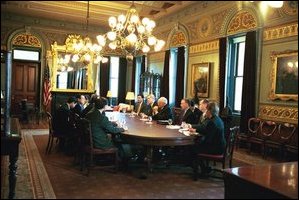
"I do not believe the President requires any additional authorization from the Congress before committing US forces to achieve our objectives in the Gulf." - Secretary of Defense Dick Cheney, December 3, 1990
________
"Our strategy to go after the Army is very, very simple. First we are going to cut it off, and then we're going to kill it." - General Colin L. Powell, USA Chairman of the Joint Chiefs of Staff, news conference, January 23, 1991
________
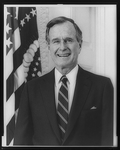
"As I report to you, air attacks are under way against military targets in Iraq...I've told the American people before that this will not be another Vietnam. And I repeat this here tonight. Our troops will have the best possible support in the entire world, and they will not be asked to fight with one hand tied behind their back.
"…Our objectives are clear. Saddam Hussein's forces will leave Kuwait. The legitimate government of Kuwait will be restored to its rightful place and Kuwait once again will be free. Iraq will eventually comply with all relevant United Nations resolutions..." - President George Bush, Address to the Nation, January 16, 1991
Bosnia -

"We know that these are the blessings of freedom, and America has always been freedom's greatest champion. If we continue to do everything we can to share these blessings with people around the world, if we continue to be leaders for peace, then the next century can be the greatest time our nation has ever known." - William Jefferson Clinton Administration, peacekeeping mission with NATO, Address to the Nation
Afghanistan -
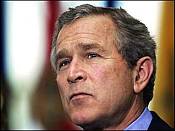
"On my orders, the United States military has begun strikes against al Qaeda terrorist training camps and military installations of the Taliban regime in Afghanistan. These carefully targeted actions are designed to disrupt the use of Afghanistan as a terrorist base of operations, and to attack the military capability of the Taliban regime." - President George W. Bush, White House Press Release of transcript – Address to the Nation
Iraq –
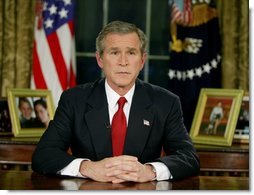
Caption: President George W. Bush addresses the nation from the Oval Office at the White House Wednesday evening, March 19, 2003. White House photo by Paul Morse
"On my orders, coalition forces have begun striking selected targets of military importance to undermine Saddam Hussein's ability to wage war. These are opening stages of what will be a broad and concerted campaign."
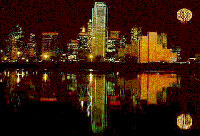
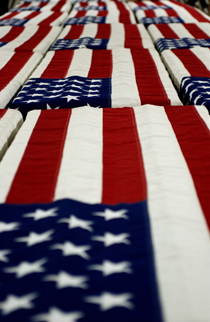
(US Military Photos)